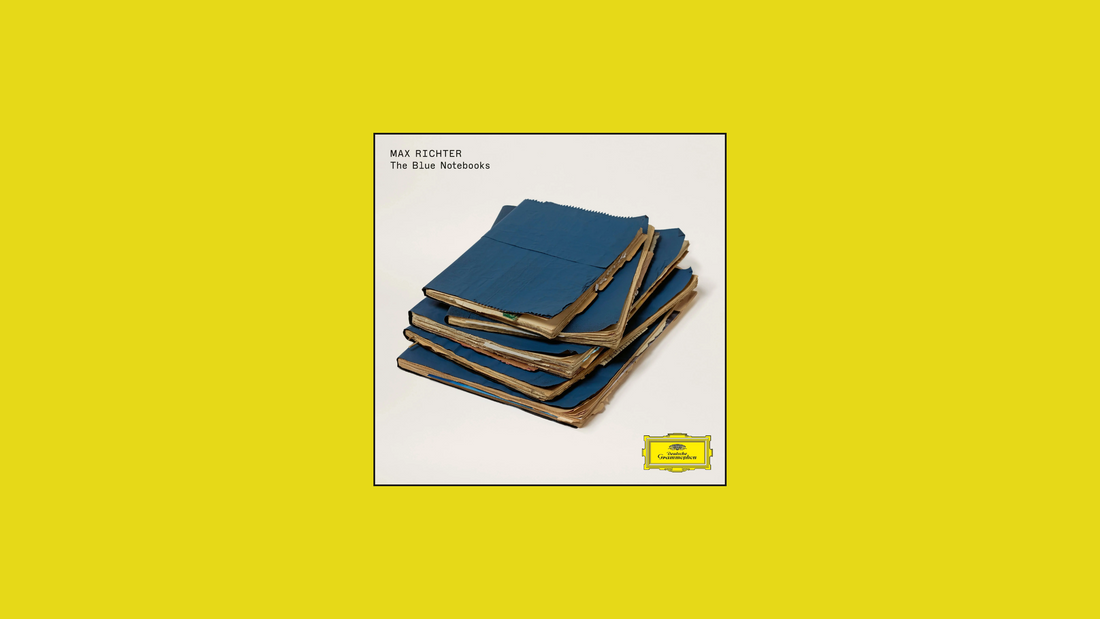
Max Richter – The Blue Notebooks (2004)
By Rafi Mercer
It begins with a voice. Not a melody, not a beat, but a voice reading Kafka: “I could not decipher the meaning of a single word.” It is the English actress Tilda Swinton, her cadence cool yet intimate, as if she were speaking just for you. Beneath her voice, a faint piano figure emerges, tentative, a few notes placed with the care of a hand resting on a fragile surface. And then strings begin to breathe. This is The Blue Notebooks, Max Richter’s breakthrough album from 2004, and though it arrived quietly, it has become one of the defining works of 21st-century listening.
Richter described the album as a protest — an act of resistance against the Iraq War, but more broadly against violence, aggression, and the coarsening of public life. But he resisted slogans or marches. His weapon was tone. He built a record where fragility itself becomes an argument, where silence and tenderness feel like forms of defiance. It is not music that shouts its politics, but music that insists on another way of being.
Listening today, what strikes me is how effortlessly the album bridges genres. Richter was trained in classical composition, immersed in the rigour of Bach and Beethoven, but he was also shaped by minimalism, electronics, and a fascination with sound itself. In The Blue Notebooks you hear echoes of Arvo Pärt’s sacred stillness, the atmospheres of Brian Eno, and a faint jazz sensibility in the way motifs are allowed to wander, to improvise upon themselves. The result is something that resists easy categorisation: not quite classical, not quite ambient, not quite cinematic — yet carrying the weight of all three.
The opening piece, The Blue Notebooks, sets the stage with Swinton’s voice and a simple harmonic wash. It is followed by On the Nature of Daylight, perhaps Richter’s most famous composition. A string ensemble rises, slow and unhurried, unfolding chords with the gravity of dawn. The melody is almost embarrassingly simple — a downward pull, a tug of inevitability — but it carries a force that has made it one of the most licensed works of the last twenty years. It appears in Arrival, in Shutter Island, in television dramas and dance performances. Yet hearing it on the album, in sequence, it feels less like a soundtrack cue and more like a prayer.
What follows deepens the mood. Horizon Variations is a miniature, just Richter at the piano, the notes falling like raindrops on glass. Shadow Journal introduces low electronic pulses beneath more Kafka readings, the juxtaposition of literature and sound sharpening the album’s sense of contemplation. Iconography spreads strings wide across the stereo field, each chord hanging like a lantern in mist.
Listening in a bar setting, the album has a unique effect. Unlike more ornamental classical records, The Blue Notebooks doesn’t demand a concert hall hush. Unlike ambient records, it never dissolves entirely into texture. It creates a space in between, where conversation can soften without vanishing, where listeners can lean in and out without losing the thread. It’s perfect for the early hours of a listening bar evening, when the room is still finding its rhythm, when you want to tune the air itself.
Richter’s gift is proportion. He knows exactly how long to let a phrase last, how much repetition will turn familiarity into hypnosis, when to break a pattern with a subtle change. It’s the kind of craftsmanship jazz musicians will recognise: the discipline of staying inside a mode until every angle has been explored. On vinyl, this becomes even more palpable. The strings bloom with warmth, the piano carries a grain that feels tactile, and the low electronics thrum like distant machinery. It is music you can walk inside.
One of the overlooked pleasures of the album is its pacing. Many records front-load their most powerful track, then taper. The Blue Notebooks builds a shape more like a novel. It begins with voice and quiet, swells toward the near-overwhelming beauty of On the Nature of Daylight, then pulls back into intimacy. The second half — Arboretum, Vladimir’s Blues, Organum — feels like a series of private sketches, fragments overheard. Only at the end, with Written on the Sky, does Richter return to something resembling closure: a solo piano piece so bare it feels like a room after everyone has left.
What makes The Blue Notebooks endure, I think, is that it sounds both ancient and modern. The string writing could belong to a 19th-century chamber piece; the electronics and sampling are firmly contemporary. The mood is timeless. It is as easy to imagine this record playing in a candlelit bar in Tokyo as it is in a gallery in Berlin or a bedroom in New York. It belongs to all of them because it builds not spectacle but space.
Personally, I find it a record I return to when the world feels too much. It doesn’t soothe in the shallow sense, nor does it numb. It clarifies. It gives shape to sadness without collapsing into despair. In this sense, it is the perfect companion for the Tracks & Tales ethos: slow listening as a form of resilience, sound as a kind of architecture you can inhabit.
Two decades on, Richter has composed longer works (Sleep), grander ones (Voices), but The Blue Notebooks retains its special force. It was his breakthrough not just because it was successful, but because it located a new language — one that has influenced countless composers, from Jóhann Jóhannsson to Nils Frahm, from Ólafur Arnalds to Hania Rani.
If you ever need proof that music can be political without slogans, listen again to Swinton reading Kafka over Richter’s piano. The words are about alienation, about failing to grasp the meaning of things. And yet the music insists on meaning anyway. It is fragile, but it endures.
Drop the needle on The Blue Notebooks in the right room. Let the strings swell. Watch how the light shifts, how shoulders loosen, how people fall quiet without being asked. That is its power. Not protest as noise, but protest as atmosphere. A reminder, still urgent, that tenderness is its own kind of strength.
Rafi Mercer writes about the spaces where music matters. For more stories from Tracks & Tales, subscribe here, or click here to read more.







